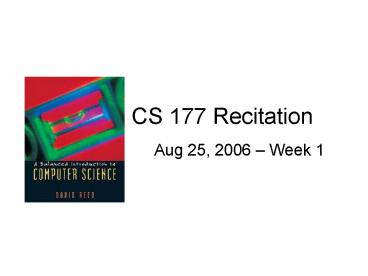CS 177 Recitation - PowerPoint PPT Presentation
1 / 17
Title: CS 177 Recitation
1
CS 177 Recitation
- Aug 25, 2006 Week 1
2
Important Things to Remember
- Course Webpage www.cs.purdue.edu/cs177
- Course Recitation slides will be posted here.
- Projects will be posted there.
- Contact details of all TAs.
3
What are Computers?
- What is a computer?
- Device that receives, stores, and processes
information - What are some different types of computers?
- Supercomputers, Desktop, Laptop, Palmtop
- What is the main difference between them?
- Size, speed, memory, problems solved
4
Hardware vs. Software
- What is hardware?
- The physical components of a computer (hard disk,
processor, mouse, keyboard, monitor, etc). - What is software?
- The programs that are written to make the
computer do something interesting. - What are computer specs?
- The capabilities of a computer. For example, how
much memory, processor speed, hard disk space,
etc.
5
The von Neumann Architecture
- What are the 3 essential components of the von
Neumann architecture? - Input/Output devices allow the user to interact
with the computer - Stores data and programs in memory.
- Central Processing Unit (CPU) performs
instructions in program to process information - Which of the three components was a major change?
- Storing programs in memory (before was only data)
6
Central Processing Unit
- What is the CPU?
- The brain of the computer. Performs
instructions to process information. - What unit is used to measure CPU speed these
days? - Gigahertz (GHz)
- What does a 2.3 GHz processor mean?
- The processor can execute roughly 2.3 billion
instructions per second.
7
Central Processing Unit Cont.
- What is an instruction?
- A simple operation the CPU can perform (add two
numbers together, move this data over here, check
if this number is zero or not) - How do computers do such complex stuff with such
simple commands?! - Speed, they do so many that the result seems very
complex.
8
Memory
- What is memory?
- The place where the CPU stores and fetches data
and instructions. - How are the data and instructions stored?
- In binary (ones and zeros). Each digit is a
bit.
9
Memory Cont.
- What basic unit is used to represent memory
capacity? - The byte 8 bits (28 256 possible values)
- What does 512MB RAM mean?
- Roughly 512 million bytes of memory.
- What makes a computers RAM better?
- Faster read/write time, more space (i.e. bytes)
10
Memory Cont.
- What types of memory are there?
- Main fast and expensive
- Secondary slower, but cheaper
- What are some examples of main memory?
- RAM, cache (memory that is saved for faster
access the next time) - What are some examples of secondary memory?
- Hard disk, Compact Disk (CD), flash drive, floppy
disk
11
Memory Cont.
- What is the difference between permanent and
volatile memory? - Volatile memory is gone when the computer is
turned off, while permanent memory stays around. - What are some examples of volatile memory?
- RAM, cache (main memory)
- What are some examples of permanent memory?
- Hard disk, Compact Disk (CD), flash drive, floppy
disk (secondary memory)
12
Software
- What are programs?
- Sequence of instructions that, when executed, do
something hopefully useful. - What are some examples of programs?
- Microsoft Word, Wordpad (word processors)
- Internet Explorer, Mozilla Firefox (browsers)
- Windows Media Player, Winamp, RealPlayer (media
players) - World of Warcraft, The Sims, Halo (games)
- Gmail, Hotmail, Purdue Webmail (email)
- Facebook, mySpace, LinkedIn (web apps)
13
Operating Systems
- What is the operating systems main task?
- Controls access to system resources by programs
(memory, CPU, etc.) - What are some examples of Operating Systems?
- Windows XP, Linux, UNIX
- How are they different?
- User-friendliness, security, stability
14
The Internet WWW
- What is the Internet?
- The global interconnection between computers
(network) that supports communication. - What is the WWW?
- An application of the Internet that allows
interlinking of documents and resources. - What are some other services available through
the Internet? - Email, Video Conferencing, Multiplayer Gaming
15
The Internet WWW Cont.
- What is a protocol?
- The rules that govern communication between two
or more computers on a network (e.g. the
Internet) - Protocols allow coordination between programs
over the Internet - For example, web browser (Internet Explorer) and
web server (www.google.com)
16
Next Week
- May want to look ahead for lab next week
- Rest of Chapter 1
- Viewing local webpages
- Chapter 2 - HTML
- HTML basics
- Formatting text
- Images, hyperlinks, lists
- Tables
17
Questions?































